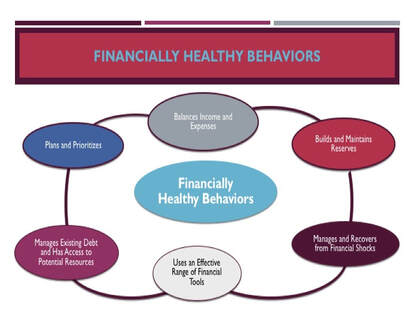Archives
May 2020
Categories
All
|
Back to Blog
 Continuing Series on the 6 Financially Healthy Behaviors Money is like food in a lot of ways. It is something that we gather and consume, and it is necessary to live. Just as improper behavior with food leaves you in ill-health, an inappropriate relationship with money can prevent financial well-being. Crash diets and get rich schemes may provide short-lived results, but without a fundamental behavior change, the results will not last. Often when it comes to money, some of our behavior can be subconscious. Our actions can be influenced by our money habitudes or by one of the four external financial health influencers. Here are 6 financially healthy behaviors working-class households can use in the journey to financial well-being. These 6 financially healthy behaviors will increase your financial capabilities and lower your money stress.  SMART GOALS SMART GOALS The next financially healthy behavior, we will look at in our series is “Plans and Prioritizes.” When you add purpose and persistence to this financially healthy behavior, you can achieve financial well-being and a MoneySmartLife. Prioritizing is determining what is REALLY important to you and your household. What has the first claims on your time, talents, and treasure? It is a balance of short and long term goals informed by your values then backed by your time, talents, and treasure. Applying your resources toward your values will result in long term success and financial well-being. It also eliminates regrets for misspent time and money. “No one ever said on their deathbed, ‘I wish I’d spent more time at the office.” --Harold Kushner. This is where the rubber meets the road. What kind of life do you really want? And what resources do you need to live it? There are no right or wrong answers. Nor should there be any judgment. Once you’ve made that decision, then adopt a lifestyle that lets you achieve it. There will be some tough choices to be made amid persistent societal/marketing pressures to conform. Conform to a greedy, consumer-based, capitalist economy. I use those terms as descriptions, not as indictments. Because that same economy can provide the resources to fund your dreams and allow you to leave a legacy. If you have a plan and financial capability. Even the wealthy prioritize. No matter how rich a person is, there is never enough money since dreams always exceed available money. Or else it wouldn’t be a dream. Unfortunately, many working-class households don’t plan. “Planning ahead is a measure of class. The rich and even the middle-class plan for generations, but the poor can plan ahead only a few weeks or days.” --Gloria Steinem. The reality is that you only have so much time and energy per day. If you have to use most of it to provide basic needs or resolving immediate money crises, then long-term planning often suffers. It is harder to see and move toward the horizon when your back is burdened, and you face gale-force economic headwinds. This is especially true of people of color in America that have suffered generations of dispossessions through the instruments of predatory capitalism. Here are two facts about priorities.
Planning behavior requires kinetic action. “Reduce your plan to writing. The moment you complete this, you will have definitely given concrete form to the intangible desire.” Napoleon Hill. Correct planning requires you to set goals and write them down. How much of your time, talent, treasure, and tenacity will be expended? What will you achieve at the end of the expenditures? Visioning and goal setting is one of the 7 components of financial capability. Your plan should be more than a general idea of where you want your life to be. Your plan should have specificity. That is where goal setting comes in. Be sure to set S.M.A.R.T. goals. Visioning is about seeing your life as you want it to be and the path to get there. Proper visioning is both pragmatic and aspirational. A dreamer must be asleep to dream. A visionary must be awake to see. Whether by dream or vision, you must consistently act in concert with it to make it a reality in your life. Let me finish with a few notable quotes about planning.
0 Comments
Read More
Your comment will be posted after it is approved.
Leave a Reply. |
MONEYSMARTLIFE.ORG EMPOWERING SUSTAINABLE FINANCIAL WELL-BEING IN WORKING CLASS FAMILIES

 RSS Feed
RSS Feed

